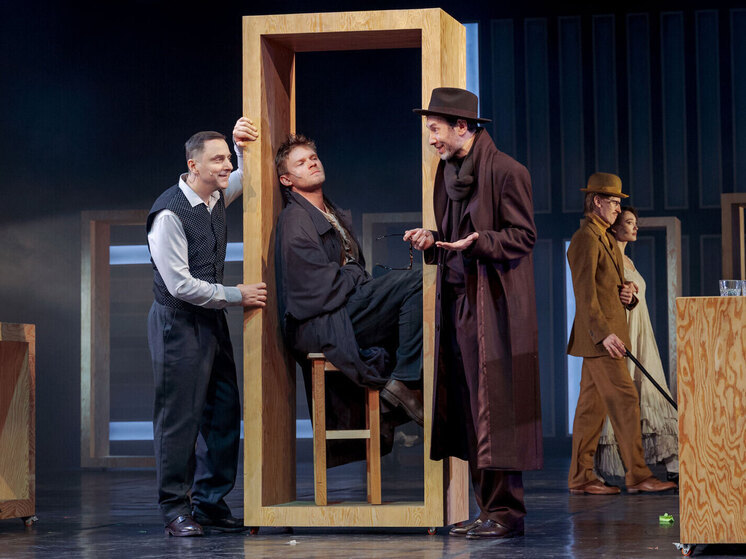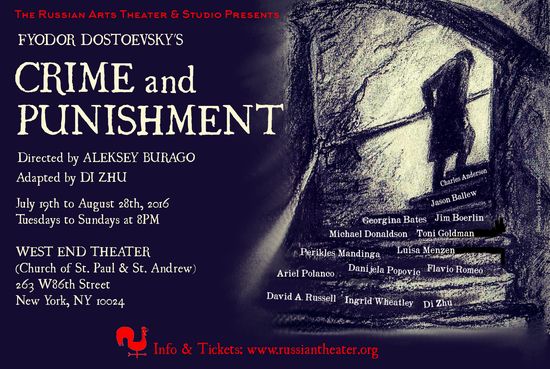The venerable Gogol Theatre in Moscow has embarked on its 101st season with an electrifying premiere: a new production of Fyodor Dostoevsky`s monumental “Crime and Punishment.” Under the bold direction of Anton Yakovlev, this adaptation promises, and indeed delivers, a theatrical experience that is as artistically audacious as it is profoundly unsettling. It’s not merely a retelling; it’s a re-examination, a visceral plunge into the very core of Dostoevsky`s enduring questions, rendered with a contemporary urgency that feels both fresh and disquietingly familiar.

A Stage as a Psyche: The Vortex of Conscience
From its opening moments, Yakovlev`s production seizes the audience with a breathtaking intensity. The stage transforms into a churning vortex of human emotion and physical objects. Ten characters, propelled by unseen forces (or perhaps, their own inner turmoil), rotate within stark, hollow rectangular structures. These ingenious pieces of set design evoke a myriad of interpretations: are they narrow closets, tables turned on end, or perhaps even coffins? They spin, empty or occupied, often hurtling past or colliding with Rodion Raskolnikov, who lies curled and trembling within his own identical box, a literal embodiment of his psychological torment. This dynamic, almost chaotic, choreography sets an immediate, high-octane pace, threatening to spill its whirlwind energy into the auditorium itself.
The inspiration for these disquieting, unstable structures, as the director reveals, comes from the surrealist paintings of René Magritte. This nod to the master of the uncanny is no mere aesthetic flourish; it perfectly mirrors the protagonist`s fractured mental state and the disorienting world he inhabits. The set is not just a backdrop; it is a character, a constantly shifting landscape of Raskolnikov`s internal battleground.
An Investigation of the Soul: Unraveling Raskolnikov`s Mind
The first act unfolds not as a linear narrative, but as a relentless investigative experiment, masterfully orchestrated by the detective Porfiry Petrovich. Actor Dmitry Vysotsky imbues the interrogator with a steely precision, driving the investigation forward with an unyielding tempo. Within this theatrical maelstrom, fragments of memory and disjointed events coalesce, forming a logical, albeit feverish, chain of testimony from the characters central to Dostoevsky`s tale: Marmeladov, Katerina Ivanovna, Sonya, Svidrigailov, the old pawnbroker, and her sister Lizaveta Ivanovna. Each recounts their version of “what truly happened,” contributing to the frenzied delusion surrounding Raskolnikov`s desperate act.
This non-linear approach, developed by Yakovlev and experienced dramatist Elena Isaeva, mirrors the chaotic nature of Raskolnikov`s own thoughts – flashes of memory, a fever dream, a desperate defense against the unbearable truth of his crime. It cleverly positions the audience not as passive observers, but as jurors in a fragmented trial of the mind, left to piece together the moral puzzle.
The New Face of a Classic Torment: Vasily Neverov`s Raskolnikov
In a bold casting choice, Vasily Neverov, an actor previously known for his character roles, steps into the colossal shoes of Rodion Raskolnikov. Unconventionally large for a role often associated with gaunt intensity, Neverov’s performance is nothing short of a revelation. Director Yakovlev deserves commendation for unearthing a compelling, vibrant leading actor, whose portrayal transcends physical expectations. Neverov navigates Raskolnikov`s descent into near madness with remarkable depth, revealing unexpected nuances: a quiet tenderness, the raw vulnerability of childhood trauma, and a pain whose roots extend far into his past.
A particularly poignant and horrific moment, serving as the climax of the first act, is the flashback to a seven-year-old Rody witnessing the brutal killing of a horse by villagers for sport, his father failing to intervene. This pivotal biographical detail, often understated, is here brought to the forefront, powerfully demonstrating the genesis of Raskolnikov`s warped worldview. Alena Goncharova’s performance as the horse in this scene is a masterclass in tragic physicality, reducing the audience to a stunned, reverent silence.
Duality and the Demonic Mirror: A Stellar Ensemble
Goncharova’s versatility extends beyond this harrowing scene; she also portrays Lizaveta Ivanovna and an enigmatic hooded figure who serves as Raskolnikov’s spectral “double,” echoing his fragmented thoughts and further developing the play’s pervasive theme of duality. This thematic thread is expertly woven through the entire ensemble, with each actor skillfully undertaking multiple roles. Notable performances include Anna Gulyarenko (the pawnbroker, Pulkheria Alexandrovna), Yanina Tretyakova (Sonya), Maria Lisovaya (Dunya, the secretary), Andrey Kondratyev (Luzhin, the horse owner), Irina Vybornova (Katerina Ivanovna, the visitor), and Andrey Rebenkov (Marmeladov, Nastena, the peasant).
Andrey Finyagin, in particular, commands the second act as Svidrigailov, Raskolnikov’s ominous “dark mirror” and a somewhat demonic reflection of Porfiry Petrovich. Finyagin’s inherent gravitas perfectly suits the role, culminating in a final monologue that is both chilling and profoundly impactful.
Dostoevsky`s Prophecy for the Modern Age
Dostoevsky’s enduring philosophical inquiry into “ordinary” versus “extraordinary” people – “trembling creatures” against “those who have the right” – remains remarkably pertinent, particularly in societies grappling with complex moral questions. Each epoch, the production posits, merely reframes this idea with its own contemporary details.
Director Yakovlev powerfully concludes his production with a direct quote from Dostoevsky’s epilogue, a haunting vision that resonates deeply with our current global landscape:
“He dreamt in his illness that the whole world was condemned to a terrible, unheard-of, and unprecedented plague… All were to perish except for a few chosen ones. New spirits appeared, settling into people`s bodies. These beings were endowed with intelligence and will. People who took them into themselves immediately became possessed. But never had people considered themselves so intelligent and unwavering in truth as these infected ones. Never did they consider anything more unwavering than their judgments, their scientific conclusions, their moral convictions and beliefs. Whole cities and nations were infected and went mad. Everyone thought that the truth was contained only in him. They did not know whom or how to judge, could not agree on what to consider evil, what good. People began to accuse one another, fought and cut, killed each other in some senseless rage. They gathered against each other in whole armies, biting and eating each other. They abandoned the most ordinary crafts, because everyone offered their own ideas, their own corrections, and they could not agree with each other. Everything and everyone perished. The plague grew and moved further and further. Only a few people in the whole world could be saved, these were the pure and chosen, destined to begin a new race of people and a new life, to renew and purify the earth…
But no one and nowhere saw these people, no one heard their words or voices…”
Is it not, the production implicitly asks, a mirror to our pervasive demonstration of insistent, ostentatious chosenness? Chosenness in wealth, in opinion, in influence – across myriad spheres? The Gogol Theatre, through this powerful work, engages its audience in a serious, timely dialogue on this critical theme.
A Glimmer of Hope in the Human Condition
In a post-performance discussion, Director Anton Yakovlev articulated his vision: “A particle of Raskolnikov lives in each of us. We are intolerant, egoistic, complacent, often excessively aggressive. Even if you do not conceive or commit a specific physical murder, but simply allow in your thoughts the division of people according to the principle – who `has the right` and who is a `trembling creature,` you are already close to the edge. But the faith and love of a specific person can save any of us. This is the only thing that leaves us a chance not to completely turn into animals. If Sonya had not appeared on his path, he would have obviously perished as a personality. This is a terrible and very modern story. I still see today how many people, having lost faith, represent an ideal vessel for the demon.”
He views the production`s ending as his “ethical statement” on the contemporary world, holding a “modest hope that we can become better. Someday. Let us at least believe in this.” This interpretation transforms “Crime and Punishment” from a historical literary masterpiece into an urgent, introspective mirror for the modern soul, urging a collective reflection on our shared humanity and the enduring power of compassion and belief.








